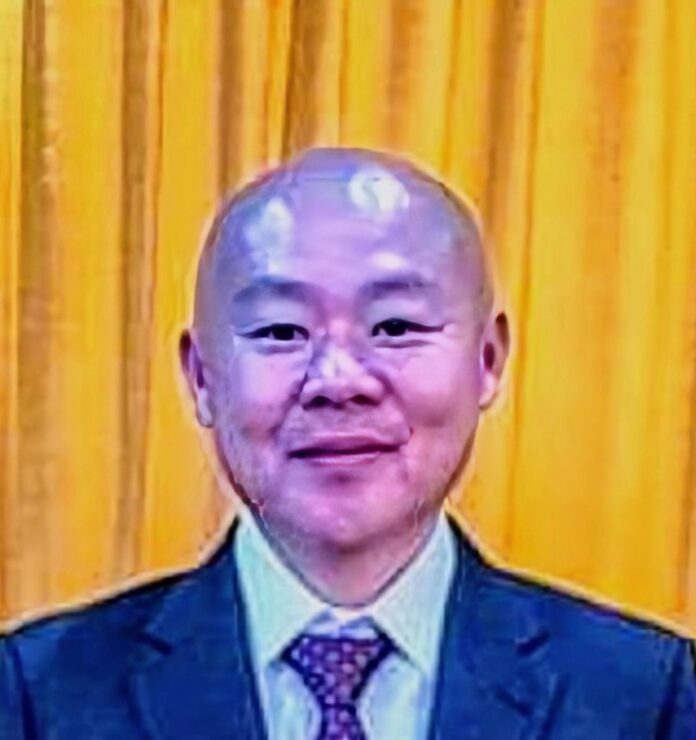By Datuk Philip Golingai

KOTA KINABALU : – The tipping point in the split between all-Sabah coalition Gabungan Rakyat Sabah (GRS) and two of its component parties, Sabah STAR and SAPP, was numerical – ie, seat numbers.
During the GRS presidential council meeting in Kota Kinabalu on Wednesday, STAR president Datuk Seri Panglima Dr Jeffrey Kitingan told the coalition’s other six presidents – including Sabah Chief Minister and GRS chairman Datuk Seri Hajiji Noor – that the maximum number of seats GRS should allow Pakatan Harapan to contest in the upcoming state elections was seven.
Kitingan’s number was derived from DAP’s existing four incumbent seats (out of the six they won in the 2020 Sabah polls, two assemblymen jumped to Parti Warisan), PKR’s two, and Upko’s one.
However, the Tambunan assemblyman and Keningau MP was told that GRS was committed to giving Pakatan 21 to 23 seats in the GRS/Pakatan electoral pact.
In a news report published on Friday, GRS secretary-general Datuk Seri Masidi Manjun stated that seat negotiations had not been finalised, which meant that there was no such thing as the ruling state coalition offering 23 seats to Pakatan.
“In fact, GRS wants to contest 55 of the 73 seats that will be up for grabs and allocate the rest [18] to Pakatan,” he said.
If GRS had agreed to solo, Kitingan and SAPP president Datuk Seri Yong Teck Lee would have remained in the coalition, which includes PGRS (led by Hajiji), PBS, Usno, PHRS, LDP, and PCS.
Both leaders left the meeting earlier than the other six party presidents.
The next day, there was speculation that STAR would issue a statement announcing its departure from GRS.
However, it did not. But a news portal with the same name as STAR ran an article quoting Kitingan as confirming that he had informed the GRS presidential council meeting that he was leaving the coalition over its decision to work with Pakatan.
Hours later, GRS automatically terminated STAR and SAPP’s membership, following their decision to opt for their own party symbols in the upcoming election.
If there hadn’t been that news report quoting Kitingan, the matter would have dragged on, with STAR doing whatever it wanted to do after the dissolution of the Sabah legislative assembly.
As of going to press, neither STAR nor SAPP has submitted their quit letter to GRS.
For context, STAR, with six assemblymen, is the third biggest coalition partner in GRS, which has ruled the state since the 2020 Sabah elections.
The backbone of the coalition is Hajiji’s PGRS with 24 assemblymen, followed by PBS with seven.
However it eventually came about, STAR and SAPP leaving the all-Sabah coalition was a long goodbye.
It was always a matter of time because of the thorny issue of a solo GRS.
Add to that the mutual distrust between the leadership of GRS and STAR and SAPP and the end wasn’t a surprise.
In fact, PGRS already had Plan B in case STAR quit the coalition.
It encouraged a PGRS leader to expand in Tambunan, Kitingan’s home base.
It was like a self-fulfilling prophecy.
The PGRS leader will likely challenge the STAR president in the stronghold of the Kitingans, who have controlled it since Tan Sri Joseph Pairin Kitingan, the former Sabah chief minister and PBS founder, won it in 1976.
Now that STAR is out of GRS, where does the loyalty of the STAR assemblymen lie?
The YBs from Paginatan, Liawan, Bingkor, Sook, and Tulid are likely to remain with GRS as direct members.
In an interview with The Star, Kitingan was asked about the ongoing video allegations of corruption by businessman Datuk Albert Tei, and replied that it was an attempt to destroy his image.
“And then to weaken GRS. And then to frighten my people, especially my YBs.”
“So even if I have to go it alone, I’ll go alone. Even if my YBs abandon me, I will go myself,” he said, adding that he would not be surprised if his assemblymen were also under pressure.
Kitingan believes that people will back him, that the Sabah for Sabahans and Sabah versus Malaya sentiment is strong among the rakyat.
With STAR’s exit, another coalition led by Kitingan, called Sabah for Sabahans (S4S), has emerged, which will include SAPP, as well as assemblymen who were dropped, former assemblymen, and grassroots leaders.
As it stands, there will be multiple-cornered fights in the Sabah polls:
GRS/Pakatan versus Barisan Nasional/Pakatan versus Parti Warisan versus Perikatan Nasional versus Parti KDM versus Black Waves vs S4S vs mosquito parties vs bebas (Independents).
In an ideal world where leaders do not have egos the size of Mount Kinabalu, the ideal solo pact – which I would call the Sabah bloc – would be STAR, Warisan, and SAPP.
Kitingan and Warisan president Datuk Seri Mohd Shafie Apdal could brand themselves as similar to the political blood brothers from Sabah’s glorious past, Tun Fuad Stephens (representing the Kadazandusun/Christians) and Tun Mustapha Harun (Bajau/Suluk/Muslims).
But ego gets in the way of unity.
Semua mau jadi ketua kampung (everyone wants to be the village head).
Ideally, even though one is with GRS and the other is out, PBS and STAR should honour their memorandum of understanding on unity, which, among other things, includes an agreement not to contest against each other.
Both parties know that unity is duty.
Yes, most of their supporters want them to go solo, but they also want the two parties to be united.
When PBS and STAR fight each other, their communities ultimately lose.
PBS knows the consequences of a divided PBS/STAR.
It will try to persuade Kitingan to honour the unity MOU for the sake of Sabahans.
In the end, this is the scenario that Putrajaya wants, a divided Sabah-based parties coalition.
GRS, Warisan, STAR, and SAPP are at each other’s throats.
Even with peninsula-based parties vying for the chief minister’s post, the local parties are fighting among themselves.
With STAR and SAPP out of GRS, it will take some sting out of Warisan’s claim that it is the only Sabah party going solo.
Now STAR and SAPP can also lay claim to that battle cry.
For example, the seat of Luyang, which is near Kota Kinabalu.
It is a DAP seat, but there is a swing towards Warisan, as some voters are disappointed with the performance of the Madani government, and also because DAP is aligned with the GRS government, among other reasons.
Now, SAPP will give the voters a real choice.
The exit of STAR and SAPP from GRS has reignited the “Sabah for Sabahans” sentiment.
Will it be ini kali lah (this is the time) for Kitingan? Or lain kali la (next time)?
Editor: The views expressed here are the views of the writer and do not necessarily reflect those of the talantang.com

